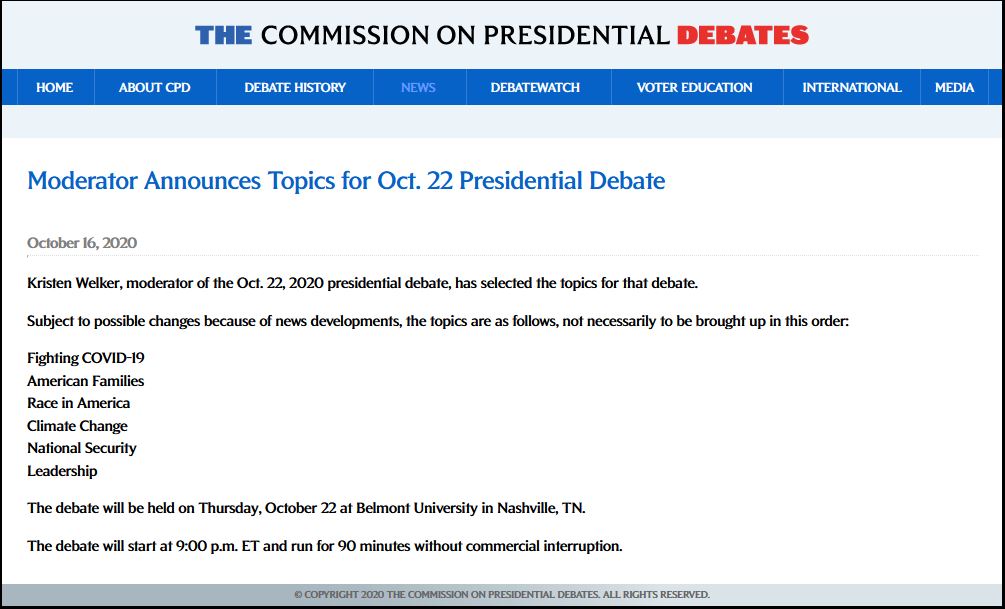“SHOCK AND AWE”
by David Wojick, ©2020

(Oct. 22, 2020) — It was not a debate, it was an argument. A flat out, both sides yelling, your another, argument. Like real people. Oh, wait, these are real people. There surely have been many arguments around the country and the world just like this, maybe millions. Painful to watch but important to see. This is what real policy arguments look like.
Trump executed it flawlessly. The left heads exploded, as if on command, which they more or less were. Trump’s ability to systematically agitate the left is amazing. He enjoys it and so do his fans. Trump was called a bully, but most Presidents are bullies, maybe all of them. It is a job qualification.
This was no accident, rather it was carefully planned, as all such meetings are. I can hear Trump now. “Why do I have to debate this [expletives deleted] fool? We have nothing to talk about. He wants to wreck America and I do not.” The rest is history and historic it is. Trump proceeded with shock and awe. Well, at least shock, lots of shock.
His ferocity is the angry people speaking. Trump decided to speak with them, as them, because that is what Trump does. He came in angry, spoiling for a fight, and a fight is what he got.
To his credit Biden responded appropriately, saying among other things, “You are the worst President we have ever had.” That simple line defines the argument. It would never have been said in a formal debate, but it accurately measures the distance between the candidates, far better than pompous policy pronouncements ever could.
Contrast the Trump-Biden-Wallace argument with the Vice Presidential candidates’ formal debate. Each VP candidate knew what the issues to be covered were, so each had a lengthy prepared set-piece presentation. These mostly stated things that each had said before, their well-known positions. Each also knew what the other was going to say so their replies were canned as well. Reviewers called it boring, which it was because of the format. One hoped for surprises but these were few.
The Trump-Biden argument was a different kind of boring, where each bored into the other’s claims. Each barrage of rapid-fire short statements quickly got into essential differences, leaving the fluff in the dust. Where the argument was going was unpredictable and often surprising, often calling for creative quick thinking.
For example, the hairy issue of climate change and energy production was not on the approved list, but they spent something like ten minutes on it. It was confused because these issues are very confused.
As a result the transcript is well worth reading. It is likely the best point-counterpoint display of the differences between Republicans and Democrats that you can find.
The structure of complex issues is my research field. If you want to see what people really think, the argument format is a good way to do it and the formal debate is a poor way. The argument format is not just point followed by counterpoint. The back and forth on a specific point may occur ten, twenty or thirty times, creating a long chain of focused disagreement. This is what you need to really unpack an issue and bore in to find the essential differences.
Conversely there is a lot of jumping around, probing for weaknesses. This is after all a battle, a battle of wits. Fighting a battle requires a lot of maneuvering and rapid reasoning. To be sure there are also a lot of false starts and mistakes. Properly viewed, a real-time policy argument like this can be fascinating, especially given what is at stake: The Presidency of The United States.
Mind you the anger is off putting. This is not about nuances of policy. This is about huge numbers of people that hate each other, or at least hate what each other believes. Like it or not, that is our situation. So let’s have it out, which they surely did.
Which brings us to the Internet. Yes this is a jump, stepping back to see why this argument happened as it did. People decry what the Internet has done, but the Internet has given everyone a voice, and what a loud voice that is. Elite pundits decry the animosity and ferocity of social media exchanges, but that is people being people. They say the same thing in the privacy of their own homes. Now they can say it globally.
All three sides (Trump, Biden and Wallace) would up speaking Twitterese, where Trump is the master. Whole sentences are not required. The transcript reads just like a freewheeling fight in the comments section of a policy blog. This is what people sound like when they argue about policy. That is the point, Trump is being a person, not a politician. The world reels. Shock and awe.
Whether it works or not remains to be seen. The President may be speaking out for an angry minority. Maybe it is time to restructure America. I hope not but I am not in charge; it is up to the voters. America will go where Americans want it to go. We will find out come November.
In the meantime we have the final debate coming up. Will it be just as rough and tumble? I hope so and think it highly likely. (I like pro football too.) The opponents will have had time to study and think about what was said before, so we may well see more boring in on the essential defining issues.
Here’s hoping the final debate is at least as good as the first, maybe even better.
In any case, what I do know is that the Presidency will never be the same. Trump is the first Internet President, using and speaking it fluently. He will not be the last. Whether the formal debate format is dead remains to be seen, but I sure like the fights.

